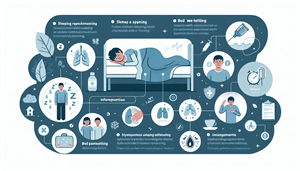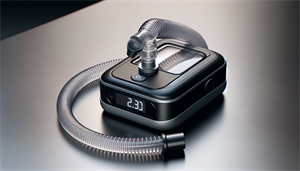
Can Sleep Apnea Cause Bed Wetting?
Can sleep apnea cause bed wetting? It’s a pressing question for many. Sleep apnea does more than disrupt sleep; it can also impact bladder control, potentially leading to bed wetting in both children and adults. This article provides a straightforward exploration of how sleep apnea is linked to nighttime accidents and what you might expect from treatment and management strategies.
Key Takeaways
Sleep apnea, particularly obstructive sleep apnea (OSA), is often associated with bed wetting (nocturnal enuresis) in both children and adults, with children suffering from OSA demonstrating a much higher prevalence of severe bed wetting. Key treatments for sleep apnea-induced bed wetting in children include adenotonsillectomy to alleviate airway obstructions and Continuous Positive Airway Pressure (CPAP) therapy to maintain an open airway during sleep, while lifestyle modifications play an important role as well. Adults may also experience bed wetting associated with sleep apnea and should seek medical advice if symptoms persist, as numerous factors like obesity, neurological disorders, and certain medications can contribute to this condition.
Understanding Sleep Apnea and Bed Wetting
Sleep apnea is a sleep disorder characterized by the temporary cessation of breathing multiple times during the night, often leading to oxygen deprivation and restless sleep. This condition may be linked to bed wetting, another one of the various sleep disorders, defined as the occurrence of bed-wetting during the night, typically in older children over the age of five. It is reported that up to 80 percent of children suffering from enuresis also have concurrent obstructive sleep apnea (OSA). Assessing a child with bed wetting for sleep apnea, particularly OSA, is crucial since it represents a significant proportion of diseases in pediatric ENT outpatients. Parents whose children are experiencing bed wetting, particularly older children, should pay close attention to the potential presence of sleep apnea symptoms and consult their physician if concerns arise.
Types of Sleep Apnea
Sleep apnea primarily falls into two categories: obstructive sleep apnea (OSA) and central sleep apnea (CSA). OSA, also known as obstructive sleep apnea syndrome, is characterized by reduced airflow despite chest and abdomen movement as the body attempts to breathe against an obstruction, whereas CSA involves significantly reduced airflow and lack of chest and abdomen movement, indicating a central nervous system issue. Symptoms of sleep disordered breathing, such as obstructive sleep apnea, encompass: Snoring, excessive daytime sleepiness, headaches, difficulty concentrating, and nocturnal urination. Early recognition of these symptoms can facilitate swift diagnosis and treatment, potentially easing the related bed wetting.
The Connection Between Sleep Apnea and Bed Wetting
The brain’s capacity to prioritize bladder control in the presence of oxygen deprivation can be compromised due to sleep apnea. This is the key reason why this sleep disorder can lead to bed wetting. Essentially, the neurological basis for the association between sleep apnea and bed wetting is a high arousal threshold, leading to reduced sensitivity to bladder filling or detrusor contraction, which in turn affects the urge to urinate. Grasping this connection aids in pinpointing the underlying cause of bed wetting in both children and adults. Treatment of the underlying sleep apnea can subsequently aid in reducing bed wetting episodes.
How Sleep Apnea Affects Children's Bed Wetting
Bed wetting in children can be particularly distressing, and sleep apnea, particularly OSA, is a common cause. Notably, it is found that around 33% of children with OSA encounter bed wetting. Furthermore, children with nocturnal enuresis have a much higher prevalence of severe OSAHS at 28.9%, in contrast to those without bed wetting. This highlights the importance of addressing sleep apnea in children experiencing bed wetting, as it can significantly impact their quality of life. Early intervention and appropriate treatment can help alleviate both sleep apnea and bed wetting in children.


